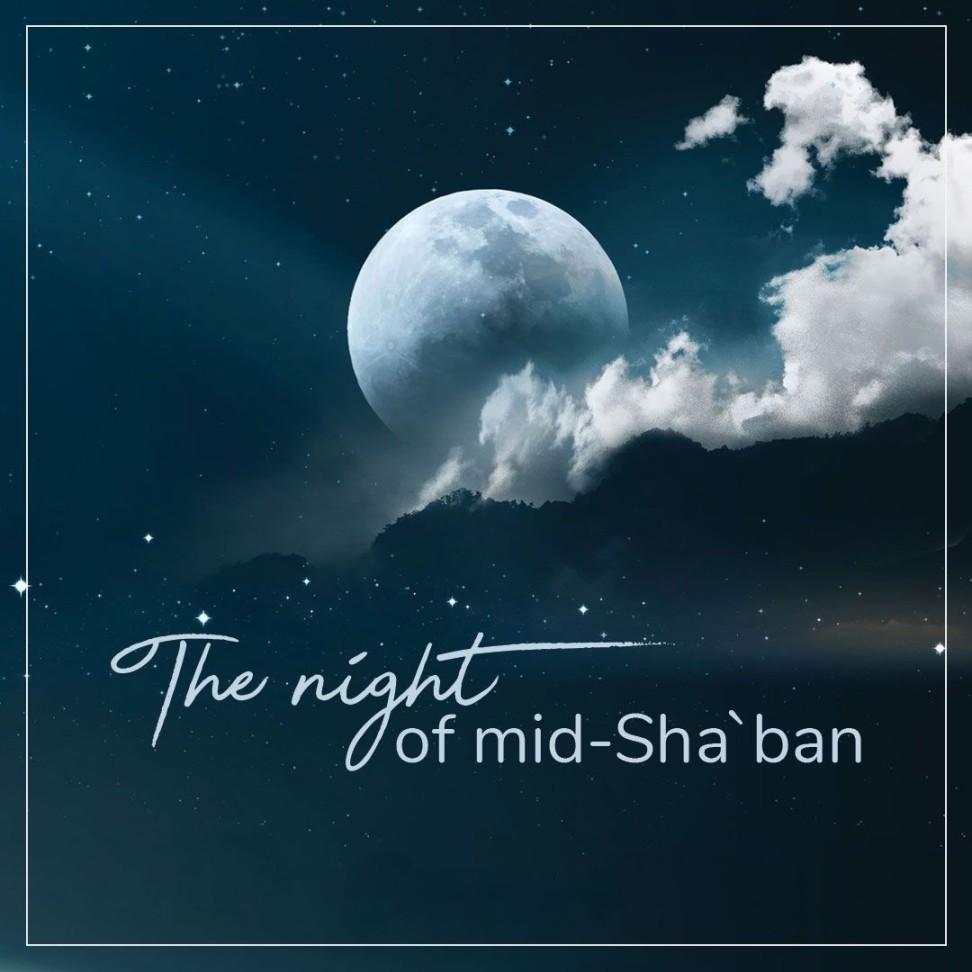The Middle of Month of Sha`bân. Night of 15 Shaaban holds profound significance in Islamic tradition, serving as a night of spiritual importance and celebration.
Shaban holds significance for various reasons, notably as a time to prepare for Ramadan. Additionally, on the 15th of Shaban (Shab-e-Barat), it’s narrated that Allah (SWT) elevates the deeds of His servants. This day is revered by many Muslims, who are encouraged to engage in extra acts of sincere worship.
What is 15th Shaban?
Shaban, the eighth month of the Islamic lunar calendar, holds special significance among Muslims worldwide. It serves as a crucial period of preparation for the holy month of Ramadan. Moreover, the 15th of Shaban, known as Shab-e-Barat or the Night of Forgiveness, carries profound importance. It’s believed that on this night, Allah (SWT) elevates the deeds of His servants, making it a revered day for many Muslims. They are encouraged to engage in extra acts of sincere worship to seek forgiveness and blessings from the Almighty.
While many scholars consider the 15th of Shaban to be a significant day of worship, others hold the belief that this month or day lacks any particular significance from an Islamic perspective.
Ibn Majâh narrated that Prophet Muhammed ( PBUH )said:
« إذا كانت ليلةُ النصفِ من شعبانَ فقوموا ليلَها وصُوموا نهارها »
(‘idhâ kânat laylatu n-niṣfi min Sha`bân faqūmû laylahâ wa ṣûmû nahârahâ)
which means: « When it is mid-Shaban night, perform acts of obedience during the night and fast during the day »
Scholars disagreed about the virtue of praying during the night on the 15th day of Sha’ban, which is the evening after sunset prayer on the 14th day. The reason for their differences was due to a disagreement over the authenticity of traditions attributed to the Prophet (ṣ) in this regard.
Mu’adh ibn Jabal reported: The Messenger of Allah, peace and blessings be upon him, said:
يَطْلُعُ اللَّهُ إِلَى خَلْقِهِ فِي لَيْلَةِ النِّصْفِ مِنْ شَعْبَانَ فَيَغْفِرُ لِجَمِيعِ خَلْقِهِ إِلا لِمُشْرِكٍ أَوْ مُشَاحِنٍ
Allah looks down at His creation on the middle night of Sha’ban and He forgive all of his creatures, except for an idolater or one harboring hatred.
The Significance of the Night of the 15th Shaban
The night of the 15th Shaban, known as Shab-e-Barat, holds immense importance in the hearts of many believers as one of the greatest nights of the year for ibaadah (worship).
1-Elevated Deeds and Seeking Forgiveness:
Foremost among its significance is the belief that Allah (SWT) raises the deeds of His servants on this auspicious day. It presents an opportunity for seeking Allah’s mercy and forgiveness for past and future sins, as well as for one’s needs to be fulfilled through sincere supplication.
2-Prophetic Narrations:
Prophet Muhammad (PBUH) emphasized the importance of this night, stating that from sunset until dawn, Allah asks His servants if they seek forgiveness, provision, or relief from suffering, indicating His readiness to grant these requests. Additionally, it’s narrated that Allah forgives all His slaves on this night except for those who associate partners with Him or harbor ill will towards fellow Muslims.
3-Decree and Destiny:
Many Muslims also believe that on the night of the 15th Shaban, Allah decrees people’s destinies for the year ahead, underscoring the significance of supplication and seeking divine intervention.
4-Virtuous Actions and Worship:
Due to its importance in Islam, believers are encouraged to spend the night in the most virtuous manner possible. This includes engaging in remembrance of Allah, seeking forgiveness, supplicating for one’s needs, and making sincere repentance.
5-Scholarly Perspectives:
While there is a difference of opinion among scholars regarding the authenticity of the narrations concerning the virtues of this night, many scholars mention its significance based on these narrations.
The Debate Surrounding the Importance of the 15th Night of Sha’ban
The significance of the 15th night of Sha’ban remains a subject of debate among Muslims. While some commemorate the night with special prayers and observe fasting the following day, others argue that such practices lack basis in the Sunnah.
In reality, scholars have categorized the hadiths concerning the 15th Sha’ban as sound (Sahih), good (Hassan), and weak (Dha’if). Despite the presence of numerous hadiths and varying degrees of weakness among them, scholars generally accept the virtue of this night as authentic.
Ibn Taymiyyah (rh) asserts, ‘So many ahadith and reports exist regarding the excellence of the 15th night of Sha’ban that one is compelled to accept that this night does possess some virtue.’ This sentiment reflects the consensus among scholars regarding the significance of this night.
Blessings of the 15th Sha’ban :
The night of the 15th Sha’ban, also known as Shab-e-Barat, is filled with blessings bestowed upon believers by Allah (SWT). Understanding these blessings and how to take advantage of them is paramount for spiritual growth and redemption.
1. Allah’s Forgiveness:
The foremost blessing of this night is Allah’s forgiveness, wherein He pardons many of His servants. The Prophet Muhammad (PBUH) described the extent of this forgiveness, except for those who associate partners with Allah or harbor ill will towards fellow Muslims.
The main blessing of this night is that Allah pours His mercy and forgiveness upon earth from Maghrib until Fajr. The Prophet (saw) described the extent of His forgiveness in powerful language in numerous narrations:
The Prophet (saw) said, ′Allah gazes at His creation on the fifteenth night of Sha’ban and then forgives all His slaves except for two types of people: those who attribute partners to Allah and those who have rancour for their fellow Muslims’. [Ahmad]
(In other narrations, he (saw) mentioned more categories of people who wouldn’t be forgiven, including those who severed the ties of kinship and those who disobeyed their parents, among others).
The Prophet (saw) also said to Aishah (ra), ′Allah descends on the night of the middle of Sha’ban to the lowest heaven, and He forgives more than the numbers of hairs on the sheep of Banu Kalb (an Arab tribe renowned for their great flocks of sheep)’. [Ibn Majah and others]
Finally, the Prophet (saw) said that on this night, from sunset until dawn, Allah asks His servants, ′Is there anyone seeking forgiveness from Me so that I may forgive him? Is there anyone seeking provision from Me so I may provide for him? Is there anyone suffering so I may relieve his suffering?′ [Ibn Majah]
2. Extended Sujood and Du’a:
During this night, the Prophet Muhammad (PBUH) engaged in prolonged Sujood (prostration) and recited specific supplications, seeking Allah’s mercy and forgiveness. Believers are encouraged to emulate this practice by offering sincere prayers for forgiveness, mercy, relief from suffering, and provision.
3. Divine Mercy:
Allah’s mercy descends upon the earth from Maghrib until Fajr, encompassing His forgiveness and blessings. The Prophet Muhammad (PBUH) emphasized the magnitude of Allah’s mercy during this time, urging believers to seek forgiveness and provision through prayer and supplication.
4. Resolve and Reconciliation:
On this blessed night, believers are reminded to reconcile with others, particularly family members, and forgive any grievances or grudges held against them. Resolving conflicts and fostering harmonious relationships contribute to spiritual purification and facilitate Allah’s forgiveness.
5. Increased Dhikr and Worship:
Engaging in increased remembrance of Allah (dhikr) and worship amplifies the spiritual benefits of the night of the 15th Sha’ban. Devoting oneself to acts of worship, such as recitation of the Quran, Salah (prayer), and reflection, strengthens the bond with the Divine and invites His mercy and forgiveness.
Dua’s to be offered for forgiveness
اللَّهُمَّ إِنَّكَ عَفُوٌّ تُحِبُّ الْعَفْوَ فَاعْفُ عَنِّي
Allahumma innaka afuwwun tuhibbul afwa fa’fu annee
“O Allah, You are Forgiving and love forgiveness, so forgive me”
رَبَّنَا لاَ تُؤَاخِذْنَا إِن نَّسِينَا أَوْ أَخْطَأْنَا
Rabbanā lā tuākhidh’nā in nasīnā aw akh ta’na
“Our Lord! Take us not to task if we forget or fall into error” [Qur’an 2:286]
Recommended Courses
Alimah Course
Weekend Alimah Course
Celebrating the Night of 15th Sha’ban

The night of the 15th Sha’ban, also known as Islamic Shab-e-Baraat, holds special significance for many Muslims, who view it as a time of divine blessings, mercy, and hope.
1. Worship and Reflection:
Muslims commemorate this night through individual or collective worship, such as the night prayers (Qiyam-ul-Layl) performed in mosques or homes. It is a time for believers to engage in sincere prayers, seeking forgiveness from Allah and reflecting on their spiritual journey.
2. Strengthening Bonds:
The night of 15th Sha’ban provides an opportunity for communities to come together and reconcile differences. Muslims are encouraged to forgive one another, mend broken relationships, and strengthen the bonds of kinship. Gift-giving and sharing sweets serve as gestures of goodwill and love among community members.
3. Acts of Charity:
A significant aspect of celebrating the 15th Sha’ban is through acts of charity (Sadaqah).Muslims should remember their duty to help those in need, following the teachings of Prophet Muhammad (PBUH) who emphasized the importance of fulfilling the needs of fellow believers. Giving Sadaqah during this auspicious night is believed to invoke Allah’s mercy and blessings.
4. Seeking Forgiveness:
The night of 15th Sha’ban is a time for seeking forgiveness from Allah for past transgressions. Believers recite specific du’as, seeking Allah’s mercy and forgiveness. Resolving conflicts, seeking forgiveness from others, and purifying the heart from grudges are essential components of this spiritual journey.
5. Fasting and Prayer:
Additionally, performing extra prayers, reciting the Quran, and sending blessings upon the Prophet (PBUH) constitute virtuous acts on this blessed night.
The night of 15th Sha’ban presents a golden opportunity for believers to draw closer to Allah and prepare themselves for the forthcoming blessings of Ramadan. This auspicious night holds immense significance in Islam, offering a chance for spiritual purification and renewal.
1. Seeking Forgiveness:
Among the most virtuous acts on this night is seeking forgiveness from Allah for any transgressions or shortcomings. Muslims are encouraged to sincerely repent and ask forgiveness not only for themselves but also for their friends and family members. It is a time to reflect on past actions and strive for spiritual growth through repentance.
2. Offering Optional Prayers:
Engaging in optional (nafl) prayers is another commendable practice on the night of 15th Sha’ban. Devoting oneself to extra prayers demonstrates dedication to worship and strengthens one’s connection with the Divine. Through prayer, believers express gratitude, seek guidance, and seek blessings from Allah.
3. Remembrance of Allah:
Dedicating time to the remembrance of Allah (dhikr) and contemplation is highly recommended during this blessed night. Reflecting on the greatness of Allah’s mercy and blessings fosters humility and gratitude in the hearts of believers. Dhikr serves as a means of spiritual rejuvenation and enlightenment.
4. Recitation of the Qur’an and Sending Salutations:
Reciting the Qur’an, the divine guidance revealed to humanity, holds special merit on the night of 15th Sha’ban. Encourage Muslims to engage in reciting the Qur’an, ponder its verses, and seek guidance from its wisdom.Additionally, sending salutations (salawat) upon the Prophet Muhammad (PBUH) is a way to express love and reverence for the Messenger of Allah.
5. Acts of Charity:
Participating in acts of charity (sadaqah) is a noble way to earn blessings on this blessed night. Remembering the less fortunate and extending a helping hand to those in need reflect the spirit of compassion and generosity advocated in Islam. By giving sadaqah, believers not only aid the vulnerable but also earn Allah’s pleasure and blessings.
Conclusion
The night of 15th Sha’ban offers Muslims a unique opportunity for spiritual elevation and closeness to Allah. Through sincere repentance, optional prayers, remembrance of Allah, recitation of the Qur’an, sending salutations upon the Prophet, and acts of charity, believers can reap the abundant blessings of this sacred night and prepare themselves for the holy month of Ramadan.

